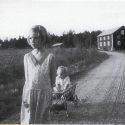Nine Christine Gudrun Jönsson was the daughter of Gottfried Jönsson, a shop steward, and Betty Jönsson, a painter. She broke off her upper secondary education to work in theatre and film. By the time she had published her debut work, she was married to PhD Paul Lindblom and had left the theatre.
Her debut novel, Vanhävd i Paradiset, 1960, is an island tale of a farm and its residents, a dark account of misery and neglect among the weak and vulnerable. In 1983, she published Djävulens anhang, the third part of her trilogy, which also includes De som teg och led, 1976, and Arbete för världen, 1978, about the rise of socialism in the wake of industrialism in Europe. She borrowed authentic material from the lives of her relatives, who were agricultural workers in Scania, as well as from the struggle for social change. Together with her husband, Nine Jönsson published two biographies: Politik och kärlek, 1987, about the Social Democratic politician and ideologue Gustav Möller and the journalist and social reformer Else Kleen, a biography with close-up portraits in the English life-and-letters tradition; and Lilla Ljuva Viva, 1995, about the mother of the Swedish politician Hjalmar Branting.


